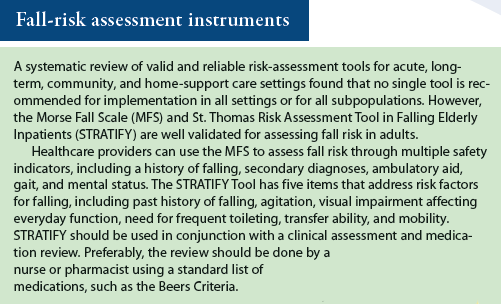Little Known Facts About Dementia Fall Risk.
Little Known Facts About Dementia Fall Risk.
Blog Article
Dementia Fall Risk for Beginners
Table of ContentsThe 5-Minute Rule for Dementia Fall RiskFascination About Dementia Fall RiskThe Main Principles Of Dementia Fall Risk Some Of Dementia Fall RiskGetting My Dementia Fall Risk To Work
The FRAT has 3 sections: drop threat status, danger element list, and activity plan. A Fall Risk Condition consists of information about history of recent falls, medications, emotional and cognitive condition of the person - Dementia Fall Risk.If the client scores on a threat factor, the corresponding number of factors are counted to the client's fall risk rating in the box to the much. If a person's loss risk rating completes five or greater, the individual goes to high risk for drops. If the person scores just 4 points or reduced, they are still at some danger of dropping, and the nurse must use their finest professional analysis to handle all loss threat aspects as part of an all natural treatment plan.
These standard strategies, in general, help create a safe setting that decreases unintended falls and defines core preventative steps for all clients. Indicators are crucial for clients at danger for drops.
The Best Guide To Dementia Fall Risk
Wristbands need to consist of the client's last and initial name, day of birth, and NHS number in the UK. Just red shade ought to be made use of to signal unique patient condition.
Things that are as well much might require the individual to connect or ambulate unnecessarily and can potentially be a danger or add to drops. Helps prevent the person from going out of bed without any type of help. Registered nurses react to fallers' phone call lights faster than they do to lights initiated by non-fallers.
Visual impairment can substantially create drops. Hip pads, when put on effectively, may lower a hip crack when autumn happens. Keeping the beds closer to the floor reduces the danger of drops and severe injury. Positioning the bed mattress on the floor significantly reduces autumn threat in some healthcare settings. Low beds are made to minimize the range a person falls after relocating out of bed.
The Dementia Fall Risk Statements
Individuals who are tall and with weak leg muscle mass that attempt to rest on the bed from a standing position are likely to drop onto the bed since it's too low for them to decrease themselves securely. Likewise, if a high client efforts to obtain up from a low bed without support, the individual is likely to fall back down onto the bed or miss out on the bed and fall onto the floor.
They're created to promote timely rescue, not to protect against drops from bed. Aside from bed alarm systems, increased guidance for high-risk individuals likewise may assist avoid drops.
-copy-5.jpg)
Clients with a shuffling gait increase fall possibilities considerably. To minimize loss threat, shoes ought to be with a little to no heel, thin soles with slip-resistant tread, and support the ankle joints. Suggest patient to make use of nonskid socks to avoid the feet from gliding upon my blog standing. However, motivate individuals to wear proper, well-fitting shoesnot nonskid socks for motion.
An Unbiased View of Dementia Fall Risk
Patients, especially older grownups, have minimized aesthetic capability. Lighting an unfamiliar environment helps increase exposure if the individual should stand up at evening. In a research study, homes with appropriate lights report fewer falls (Ramulu et al., 2021). Enhancement in lighting at home might reduce autumn rates in older adults (Dementia Fall Risk). The usage of gait belts by all health treatment suppliers can promote safety and security when aiding individuals with transfers from bed to chair.

Caretakers work for assuring a safe and secure, secured, and safe setting. However, studies demonstrated extremely low-certainty evidence that sitters reduce fall risk in intense treatment hospitals and just moderate-certainty that options like video clip monitoring can lower sitter usage without increasing autumn danger, recommending that sitters are not as beneficial as at first thought (Greely et al., 2020).
The Definitive Guide to Dementia Fall Risk

Boosted physical conditioning decreases the risk for falls and restricts injury that is sustained when autumn takes place. Land and water-based workout programs may be in a similar way useful on equilibrium and stride and thus lower the risk for drops. Water exercise might add a favorable advantage on equilibrium and gait for women 65 you can look here years and older.
Chair Increase Exercise is an easy sit-to-stand exercise that assists strengthen the muscle mass in the upper legs and butts and improves movement and independence. The goal is to do Chair Surge exercises without utilizing hands as the client ends up being more powerful. See sources area for an in-depth direction on just how to execute Chair Rise exercise.
Report this page